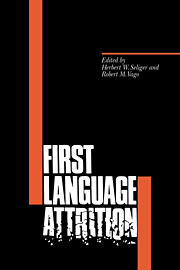Book contents
- Frontmatter
- Contents
- List of figures
- List of tables
- List of contributors
- Acknowledgment
- Part I Survey studies
- Part II Group studies
- Part III Case studies
- 12 Morphological disintegration and reconstruction in first language attrition
- 13 Assessing first language vulnerability to attrition
- 14 Compensatory strategies of child first language attrition
- 15 Language attrition, reduced redundancy, and creativity
- 16 Paradigmatic regularity in first language attrition
- Index
13 - Assessing first language vulnerability to attrition
Published online by Cambridge University Press: 14 January 2010
- Frontmatter
- Contents
- List of figures
- List of tables
- List of contributors
- Acknowledgment
- Part I Survey studies
- Part II Group studies
- Part III Case studies
- 12 Morphological disintegration and reconstruction in first language attrition
- 13 Assessing first language vulnerability to attrition
- 14 Compensatory strategies of child first language attrition
- 15 Language attrition, reduced redundancy, and creativity
- 16 Paradigmatic regularity in first language attrition
- Index
Summary
Introduction
This chapter addresses the issue of which aspects of first language grammar are most vulnerable to attrition. Three untimed tasks are used to examine the first language knowledge of two proficient German–English bilinguals for the purpose of outlining methodological approaches to the investigation of this issue. The first experiment is an untimed sentence judgement task which investigates the vulnerability of first language (German) surface word order under the influence of second language (English) word order. The second task, also an untimed sentence judgement task, examines the vulnerability of first language selectional restrictions under the influence of second language idiomatic verb usage. The third task is an untimed fill-in task which assesses the vulnerability of first language gender and pluralization information and the relationship of this information to the factors of frequency and predictability. The experimental data will be useful in drawing preliminary conclusions regarding first language vulnerability to attrition as well as highlighting potentially fruitful areas for future research. Some of the issues for which these types of tasks and their findings have relevance will first be briefly outlined.
The competence/performance issue, of central importance in all psycholinguistic research, is of special significance in research on proficient bilingualism. This is because, on the one hand, the proficient bilingual must have a knowledge of two distinct sets of grammatical rules and forms, one for each of his/her languages, since no two languages are so similar that they can be described by the same descriptively adequate grammar.
- Type
- Chapter
- Information
- First Language Attrition , pp. 189 - 206Publisher: Cambridge University PressPrint publication year: 1991
- 26
- Cited by



